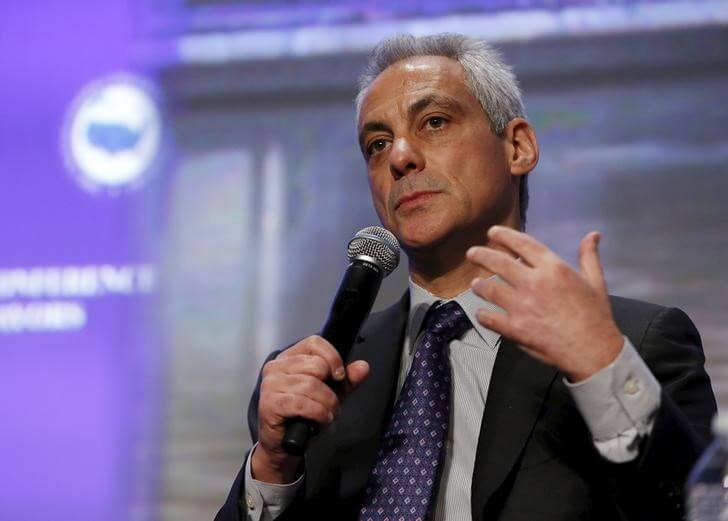By Karen Pierog and Dave McKinney
CHICAGO (Reuters) – Chicago Mayor Rahm Emanuel unveiled a plan on Wednesday that he called “an honest approach” to save the city’s biggest retirement system from insolvency with a water and sewer tax to be phased in over five years starting in 2017. The municipal retirement system, which covers about 71,000 current and former city workers, is projected to run out of money within 10 years as it sinks under an unfunded liability of $18.6 billion. The new tax would generate $56 million in its first year and increase to $239 million annually by 2020, the mayor’s office said.
“Today, one of the big question marks that hung around the city because of past decisions – or past decisions that were not made – we have addressed,” Emanuel told an investor conference in Chicago, adding that the city has now identified specific revenue streams to support each of its four retirement systems. The plan requires city council approval, which Emanuel said he intends to seek in September. Chicago then needs the Illinois state legislature to approve a five-year phase-in of the city’s contribution to the pension system to boost the funded level to 90 percent by 2057 from the current 32.9 percent. The tax would follow an increase in water and sewer rates between 2012 and 2015 to generate money to repair and replace aging infrastructure. Revenue rose from $644.1 million in 2011 to $1.125 billion in 2015. Pension contributions by new municipal workers would increase and not all affected unions have signed on to the plan. Anders Lindall, a spokesman for the American Federation of State, County and Municipal Employees Council 31, said the plan is under review. The rescue plan for the municipal system follows previous action by the city to boost funding for police and fire pensions through a phased-in $543 million property tax increase, and its laborers’ system through a hike in a telephone surcharge. Chicago’s big pension burden was a driving factor in the downgrade of the city’s credit rating last year to the “junk” level of ‘Ba1’ by Moody’s Investors Service. But in March, the task of fixing the city’s pensions became harder after the Illinois Supreme Court threw out a 2014 state law that reduced benefits and increased city and worker contributions to the municipal and laborers’ funds. (Editing by Chris Reese, G Crosse)
Chicago mayor’s plan to fix municipal pension fund seeks water, sewer tax

By Karen Pierog and Dave McKinney

















